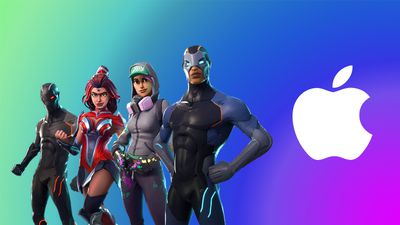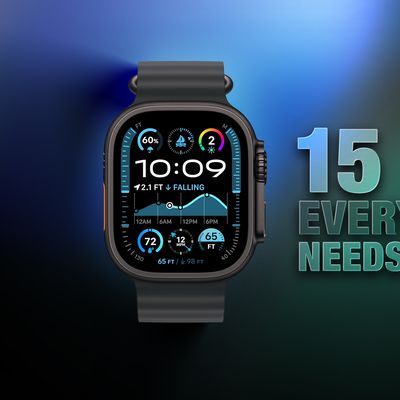As Epic Games prepares for its upcoming bench trial with Apple, the company has today published depositions that it conducted with several executives, including current iTunes chief Eddy Cue and former software engineering chief Scott Forstall.

As someone involved with the App Store since its inception, Cue was asked many questions about how the store runs, and he was also queried on whether Apple once considered opening iMessage up to Android users. "At the time, I think we could have made a version [of iMessage] on Android that worked with iOS," Cue said. Cue had sent a message to other Apple executives in 2013 to recommend making an Android version of iMessage "an official project."
Others at Apple, such as Phil Schiller, were against adding the feature to Android because there wasn't a clear strategy on how to get Android users to adopt it. "I am concerned the iMessage on Android would simply serve to remove an obstacle to iPhone families giving their kids Android phones," Schiller wrote to Cue and others.
Cue said he did not agree that not having iMessage on Android created an obstacle to families giving their kids iPhone devices, and there's several additional paragraphs of dialogue in that conversation that are then redacted.
Epic Games also queried Cue about how Apple arrived at its original 30 percent cut, which was derived from Apple's aim to cut costs from brick and mortar stores that were charging 40 to 50 percent to distribute software. There "wasn't really any kind of App Store" to compare to at the time, so Apple had to use other distribution methods as a guideline. "We wanted it to be cheap compared to anything that [app developers] had experienced before.
The lawyers from Epic were aiming to get Cue to explain whether there were any specific discussions around the breakdown of the 30 percent figure, such as SDK costs, but Cue said there wasn't.
We obviously monitor our costs and what are costs are in running Apple at different points and different locations and different pieces of it. So I'm sure there are people that are looking at the cost of doing things around it. As it relates to the 30 percent of like, here's our justification for doing that, no, I don't recall having a conversation like that.
Cue was asked whether Epic's decision to introduce its own direct payment method in the Fortnite app led to any security vulnerabilities on the iPhone, a line of questioning that directly relates to Apple's argument that in-app purchases and App Store rules keep the App Store secure. "I don't recall anything," said Cue.
Other topics of conversation included scam apps that have defrauded customers, the possibility of web apps on Apple Arcade, and whether or not payment methods like credit cards or PayPal could introduce hardware vulnerabilities into the iPhone, which Cue said wouldn't be possible, along with discussions about redacted emails.
As for Scott Forstall, Epic's questions focused on the development of the original iPhone and its operating system, which in the early days was based on OS X. Epic lawyers wanted to know whether Apple considered having an open software platform when developing iOS, as OS X was a more open platform.
On this particular question, it's a great example where the specificity matters. There were executives at Apple that thought we should never release the ability for third parties to do anything natively compiled applications.
There were executives who thought - and they thought we should just have web applications and - and then websites running with web standards inside of the browser or browsers on the platform, the browser. There were executives who thought we should have a hybrid model of some web technologies and some native abilities. And then there were executives who thought we should provide a platform to enable third parties to build fully native applications on the platforms.
Steve Jobs was the one who felt that iOS should never be opened up to third-party apps, and Forstall said he was the most vocal in calling for third-party app development in the App Store. "This is discussions Steve and I had multiple times, heated ways," he said.
Forstall talked about native apps vs. web apps, which is of interest because one of Apple's arguments is that developers can create web apps on iPhone. Forstall said that with the original iPhone, Apple built its own native apps which were performing better than web apps. "We could tell using [the iPhone] that they were not as good as performing as the built-in apps."
Even though there are arguments people can make and did make for using web technologies as the sole way for third parties to build apps, my experience was very clear that those apps would not be as good as native apps, and I wanted to have the best possible apps in the platform we could.
Forstall also covered topics that included jailbreaking, Apple's concern about viruses and malware when allowing third-party apps in the App Store, early disputes with Facebook over links to web apps, a time in 2007 when Apple had not yet decided to limit third-party app distribution to the App Store, and a mention by Steve Jobs that at its inception, the App Store wasn't designed to make money for Apple.
All of these topics are likely to resurface during the trial, which is set to begin on Monday, May 3. Epic's full deposition report is available below with the complete transcription of comments made by Cue and Forstall, along with testimony from Phillip Shoemaker, Adrian Ong, CK Haun, Eric Friedman, and Ron Okamoto.





















